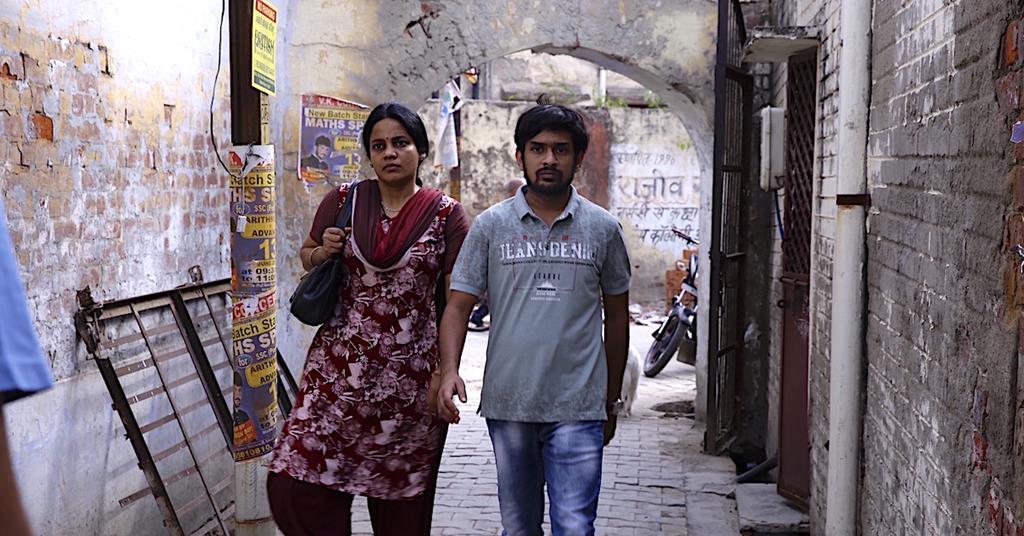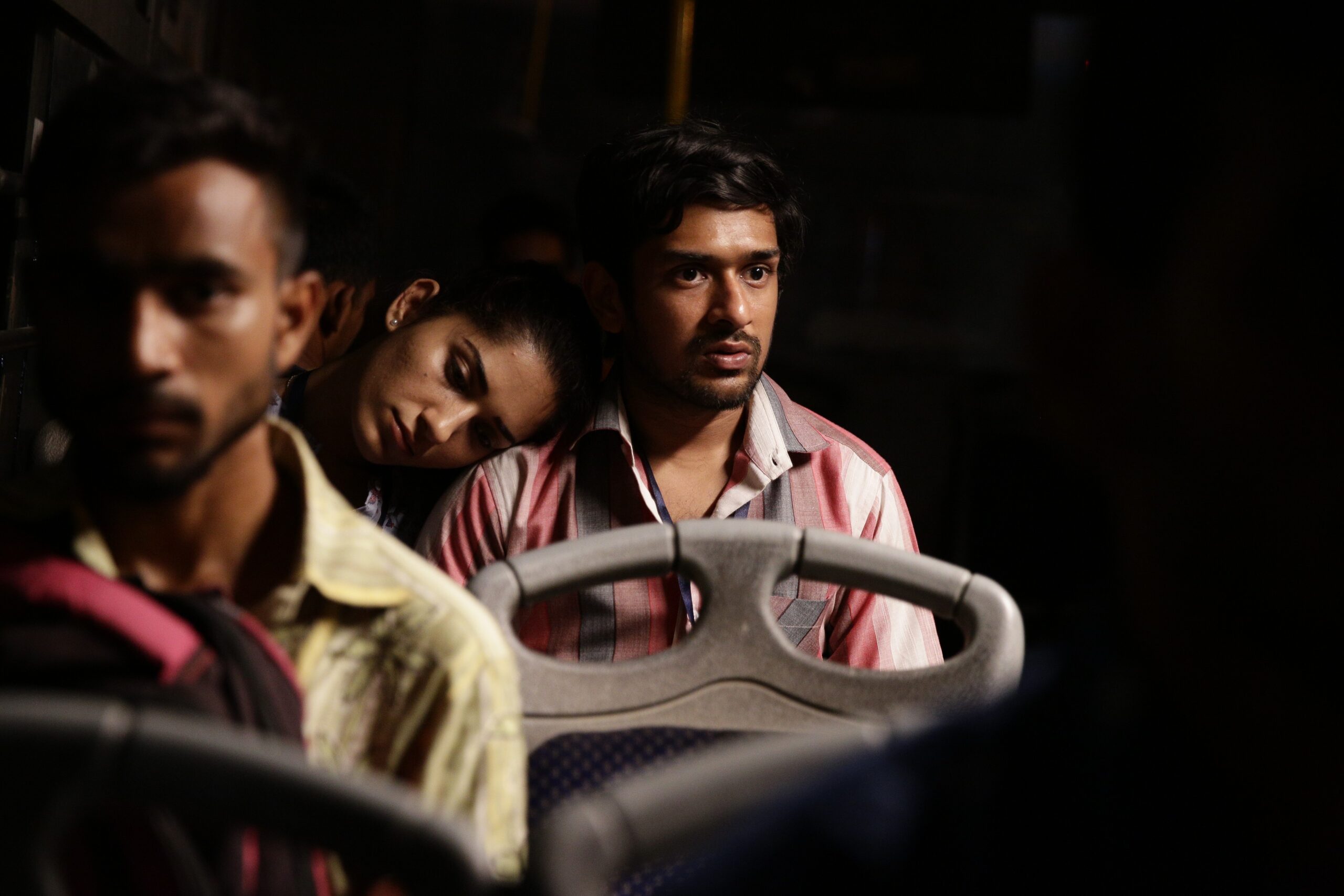Kanu Behl’s sophomore Agra takes an unapologetic stance on the exploration of human desires, particularly the extremes to which one can go to satiate their repressed wants. In this stark tale, empathy becomes a casualty, sacrificed at the altar of self-preservation. Antipathy becomes a shield, not just against societal judgment but against the relentless inquiry into the protagonist’s soul. Being the victim of fractured masculinity, he becomes the unwitting perpetrator, orchestrating a cycle of belligerent steps that threatens to consume any flicker of virtuous clarity. Yet, amid this psychological battleground, the very excuses that he clings to for survival become the chains that bind him to a distorted reality. The assertive conduct, once a coping mechanism, transforms into a prison of his own making. The walls echo with haunting whispers of what could have been, drowned out by the cacophony of corollaries that now define his existence.
In the labyrinth of Agra’s cramped lanes, the tale of Guru and his family unfolds within the dilapidated confines of a two-story house that stands as a silent testament to the discord festering within its walls. Guru yearns for space on the terrace, envisioning it as his private sanctuary with his imaginary girlfriend, a whimsical escape from the suffocating realities that envelop the house. Yet, his aspirations collide headlong with the ambitions of those sharing his precarious living quarters. Guru’s father inhabits the upper floor with a second wife, a potential bridge between his two disparate worlds. She envisions the terrace blossoming into a garden. Nursing wounds inflicted by her estranged husband’s departure, Guru’s mother envisions a different destiny for the terrace—a dream of opening a clinic, a venture entwined with the aspirations of Guru’s ambitious cousin, Chhavi. The collective ambitions of the family members weave a tapestry of hope, contrasting sharply with the discord that permeates the household. Meanwhile, in the serendipitous dance of fate, Guru crosses paths with Priti, a proprietor of an internet café, her own history shrouded in a veil of misfortune and tragedy. Yet, the enigmatic convergence of their destinies becomes the fulcrum upon which the narrative pivots, piquing our interest in where this unexpected alliance will lead both Guru and his newfound companion.

Agra challenges and grapples with the discomfort of navigating through the shades of human complexity. In this sea of contradictions, repulsion and pity coexist, rendering the protagonist a mosaic of emotions that elicit not just judgment but an intriguing sense of introspection. Guru’s abode, a structure weathered by time and strife, breathes with the echoes of unresolved tensions. The house, a maze of emotions, harbors not just splintered familial ties but also intricate threads of conflicting desires. At the heart of this domestic maelstrom is Guru, a dreamer yearning for autonomy. The house becomes a pressure cooker of emotions, with volatile inhabitants teetering on the brink of a violent breakdown. As Guru consumes phenyl in front of his family members, it demonstrates that the lack of individual privacy has transformed him into a pressure point, and the shared space becomes a crucible for familial strife. The air is thick with an impending sense of doom, accentuated by the tangible toxicity that courses through the veins of this deteriorating dwelling. This ominous atmosphere becomes glaringly apparent when Guru viciously assaults the doctor, reducing the situation to a disturbing display of his disturbed mind.
In collaboration with co-writer Atika Chohan, Kanu Behl employs a deft touch, immersing the audience in the palpable atmosphere of the film. The orchestrated chaos and confrontations are not merely plot devices but become immersive experiences that evoke a visceral response. A particularly striking scene unfolds as Guru pays a visit to the girl he encountered in an online sex chat room. The humiliation is palpable, briefly inviting a moment of empathy. But Behl quickly breaks our expectations as he swiftly portrays Guru engaging in something reprehensible in the subsequent scene, where he mistakes a caring soul’s affection for consent and proceeds to assault her. Guru’s intimate moments with Priti carry an almost primal aura, rendering his lustful desires automated and restrictive, devoid of the unshackled ecstasy often associated with such acts. Instead of eliciting love or unadulterated lust, these encounters exude an air of agony, an emotional state that transcends mere physicality.
Agra transcends its physical boundaries, becoming a metaphor for the fractured relationships and unfulfilled dreams that plague its inhabitants. The open space on the terrace, once a symbol of possibility, morphs into a battleground where the characters confront their deepest fears and desires. In this crucible of familial turmoil, Agra invites audiences to witness the explosive collision of dreams, the consequences of shared living without shared understanding, and the potential for redemption amid the ruins of ruptured relationships.

Saurabh Monga‘s cinematography and Parul Sondh’s production design work in tandem to deftly accentuate the film’s grimly threatening atmosphere, wrapping it in an oppressive shroud that conveys an overwhelming sense of confinement. The auditory landscape, crafted by Pritam Das and Philippe Grivel, amalgamates ambient sounds, music, and moments of silence, serving as a seamless counterpart to the intricately woven visuals that are entwined in the very fabric of a family on the precipice of unity. In various scenes, the audio backdrop morphs into Bollywood songs from the 90’s emanating from a diegetic source, contributing to the chaotic symphony, as dialogues are vehemently belted out over its tunes. Karan Gour‘s musical backdrop exudes a brooding essence. The editing by Nitesh Bhatia and Samarth Dixit sustains a delicate and seamless cadence, guiding the narrative into a captivating whirlwind of emotions.
Mohit Agarwal infuses Guru’s restlessness with intensity. His countenance synchronizes with his objectionable behaviors, contributing to the intricate layers of a character who is both unlikeable and unshakeable. In the character of Priti, Priyanka Bose adds nuanced touches to a raw and unfiltered canvas, painting with sincerity where every brushstroke reveals a layer of authenticity. She cuts through the complexities of circumstance and doesn’t wield it with callousness; instead, she tempers it with vulnerability. Rahul Roy, Vibha Chhibber, Sonal Jha, and Aanchal Goswami, in their roles as the supporting ensemble, immerse themselves in bringing life to their characters. These individuals, whose destinies intertwine with the protagonist, become pivotal forces shaping the ultimate trajectory of the narrative.
Overall, Agra (2023) stands as a testament to the art of storytelling that refuses to spoon-feed morality. Its characters, with their flaws laid bare, beckon viewers into a realm where the boundaries between sympathy and disdain blur, paving the way for a more nuanced comprehension of what it means to be human. The trajectory of the story, initially promising, becomes fraught, leading to a conclusion that feels hastily executed. It’s as if the narrative, once soaring, now grapples with its own weight. What stands out in the film is its refusal to tread the trodden path of conventional likability, a bold artistic choice for grappling with the discomfort of navigating through the shades of human complexity. Agra bravely confronts audiences with uncomfortable truths, pushing boundaries, and challenging societal norms. This bold approach is sure to leave some viewers uneasy, but it is precisely this discomfort that Behl seems to strive for, and he achieves it effectively.
AGRA will be screened at the 28th International Film Festival of Kerala (IFFK) in the International Competition section.




